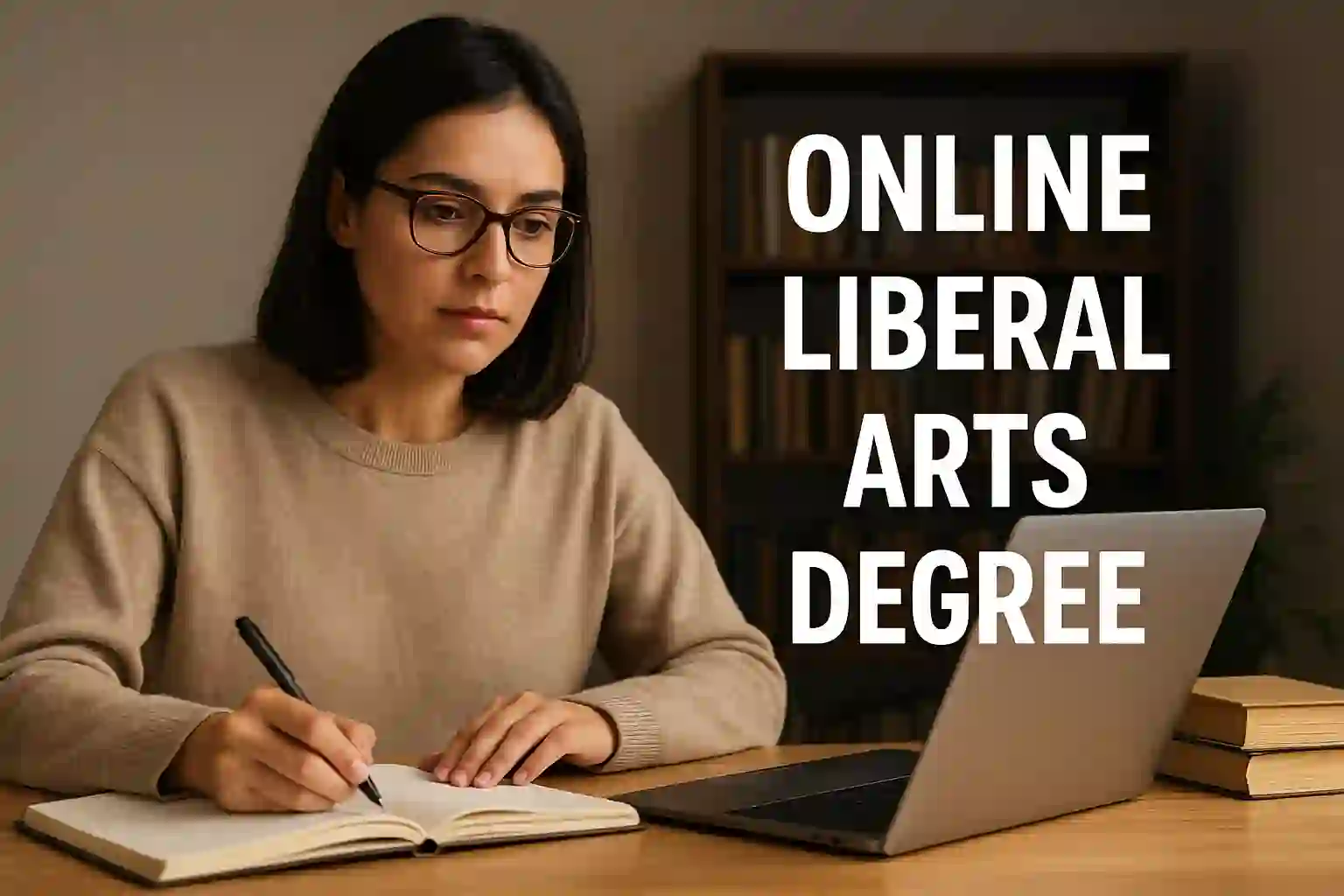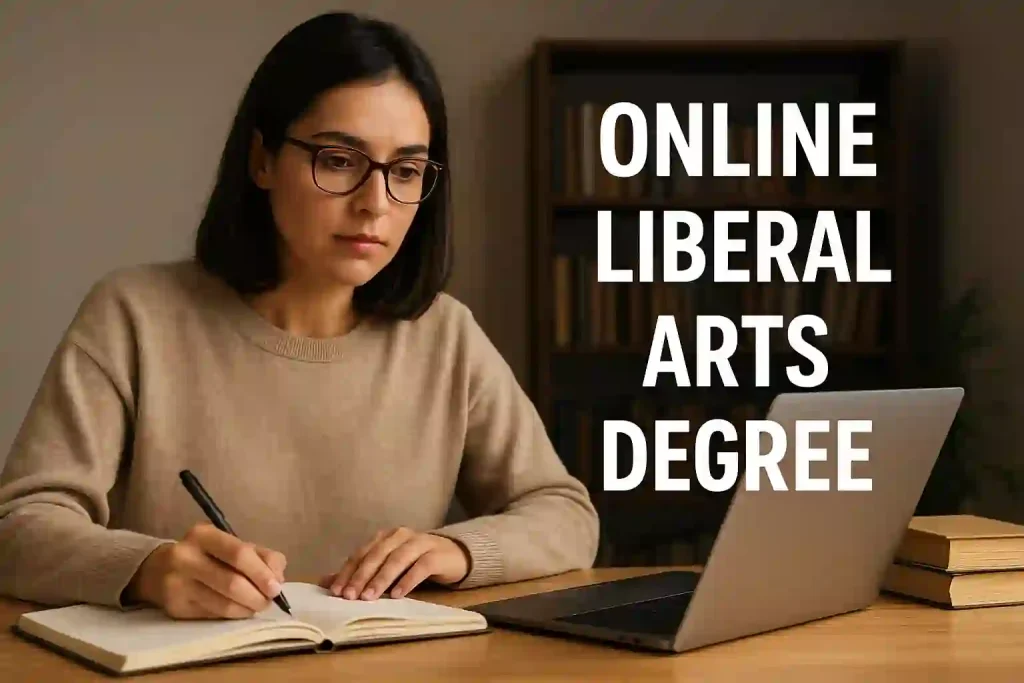Online Liberal Arts Degree: A Comprehensive Guide to a Timeless and Flexible Education

In a rapidly changing global economy driven by technology, automation, and digital transformation, the value of a broad-based, flexible education is increasingly recognized. The online liberal arts degree represents one of the most adaptable and intellectually enriching academic pathways available to modern learners. By combining the humanities, social sciences, natural sciences, and the arts, this degree cultivates critical thinking, communication, and analytical skills essential to success in virtually any professional environment.
With the rise of digital learning technologies and accredited online universities, the liberal arts degree has evolved beyond traditional classroom settings. Students across the United States and around the world can now pursue a bachelor’s or master’s degree in liberal arts online, often while balancing employment, family, or other commitments. This guide explores every dimension of the online liberal arts degree — from its academic structure and advantages to its career outcomes and long-term significance in a rapidly evolving world.
Understanding the Liberal Arts Tradition
Table of Contents
Origins and Philosophy
The term “liberal arts” originates from the Latin artes liberales, meaning “the skills of free citizens.” In ancient Greece and Rome, these disciplines represented the foundational knowledge necessary for civic participation and personal development. Historically, the liberal arts encompassed the Trivium (grammar, rhetoric, and logic) and the Quadrivium (arithmetic, geometry, music, and astronomy). Together, they formed the basis of higher education throughout the Middle Ages and the Renaissance.
In the modern context, the liberal arts have expanded to include a wide range of fields — literature, history, philosophy, political science, psychology, sociology, mathematics, and natural sciences. The liberal arts curriculum emphasizes intellectual breadth, critical inquiry, and interdisciplinary understanding — skills that remain relevant in today’s complex, interconnected world.
What Is an Online Liberal Arts Degree?
An online liberal arts degree is an academic program offered through digital platforms that allows students to complete coursework, interact with professors, and earn a degree entirely or partially online. These programs are typically offered at the associate, bachelor’s, and master’s levels and are designed to provide a well-rounded education that integrates multiple disciplines.
Program Formats
- Fully Online Programs:
Courses, assignments, and exams are completed entirely through digital learning management systems (LMS) such as Canvas, Blackboard, or Moodle. - Hybrid or Blended Programs:
Combine online instruction with limited on-campus sessions, workshops, or residencies. - Accelerated Programs:
Designed for adult learners or professionals, these allow faster completion, often in 18–24 months.
Degree Levels
- Associate of Arts (A.A.) in Liberal Arts: Foundational 2-year program.
- Bachelor of Arts (B.A.) in Liberal Arts: Comprehensive 4-year undergraduate degree.
- Master of Liberal Arts (M.L.A. or M.A.L.S.): Advanced interdisciplinary graduate program.
Core Components of a Liberal Arts Curriculum
Online liberal arts programs are structured to ensure a balance between breadth and depth. Core coursework typically includes:
- Humanities: Literature, philosophy, art history, religion, and languages.
- Social Sciences: Sociology, psychology, anthropology, economics, and political science.
- Natural Sciences: Biology, physics, environmental science, and mathematics.
- Communication and Rhetoric: Writing, public speaking, digital communication, and media studies.
- Global and Cultural Studies: History, ethics, and cultural diversity.
Students may also have the flexibility to choose concentrations or thematic tracks such as:
- Global Studies
- Digital Humanities
- Communication and Media
- Political Science
- Philosophy and Ethics
- Environmental Studies
Advantages of Earning a Liberal Arts Degree Online
1. Flexibility and Accessibility
Online programs allow students to study at their own pace from any location. This is especially beneficial for working adults, military personnel, and caregivers balancing multiple responsibilities.
2. Interdisciplinary Skill Development
The liberal arts education fosters essential transferable skills — critical thinking, communication, research, and problem-solving — that are applicable across industries and professions.
3. Cost-Effectiveness
Online programs often have lower tuition rates, reduced transportation expenses, and access to digital resources that minimize textbook costs.
4. Career Versatility
Graduates of liberal arts programs are equipped to enter diverse fields such as education, public service, media, business, technology, and non-profit management.
5. Lifelong Learning and Personal Growth
Beyond professional development, liberal arts education cultivates ethical reasoning, cultural literacy, and intellectual curiosity, supporting lifelong learning and civic engagement.
Accreditation and Academic Quality
When selecting an online liberal arts program, accreditation is the most critical factor. Accreditation ensures that the institution meets recognized standards of academic quality and that credits are transferable to other universities.
Types of Accreditation
- Regional Accreditation:
The most prestigious and widely recognized type of accreditation in the United States. Examples include:- Middle States Commission on Higher Education (MSCHE)
- Southern Association of Colleges and Schools Commission on Colleges (SACSCOC)
- Higher Learning Commission (HLC)
- National Accreditation:
Often applies to career or vocational schools. While valid, regional accreditation is generally preferred for liberal arts programs. - Programmatic Accreditation:
While liberal arts programs rarely require specific programmatic accreditation, many universities hold institutional memberships in organizations such as the Council of Independent Colleges (CIC) or the Association of American Colleges and Universities (AAC&U).
Typical Admission Requirements
Admission criteria for online liberal arts degrees vary by institution and program level but commonly include:
- High school diploma or GED (for undergraduate programs)
- Official transcripts from prior institutions
- Statement of purpose or personal essay
- Letters of recommendation (often optional)
- Minimum GPA requirements (commonly 2.5–3.0)
- English language proficiency for international applicants (TOEFL, IELTS)
Some universities also offer test-optional policies, waiving SAT or ACT requirements for online applicants.
Course Delivery and Learning Experience
Online liberal arts programs use Learning Management Systems (LMS) to host lectures, assignments, and discussions. Students interact through discussion forums, live video sessions, and digital collaboration tools.
Common Features
- Asynchronous Learning: Pre-recorded lectures, accessible anytime.
- Synchronous Sessions: Live classes or discussions with real-time interaction.
- Virtual Libraries and Digital Archives: Access to e-books, journals, and databases.
- Capstone Projects or Portfolios: Culminating experiences demonstrating interdisciplinary learning.
Many programs also emphasize writing-intensive coursework and critical analysis, encouraging students to apply theoretical knowledge to real-world issues.

Prominent Universities Offering Online Liberal Arts Degrees
Several accredited U.S. universities provide high-quality liberal arts programs online:
- Harvard University – Extension School
Master of Liberal Arts (ALM) with flexible online and low-residency options. - Arizona State University (ASU) Online
Offers a fully online Bachelor of Arts in Liberal Studies emphasizing interdisciplinary research and writing. - University of Massachusetts Global
Provides customizable liberal arts programs focused on communication, ethics, and critical inquiry. - Southern New Hampshire University (SNHU)
Offers affordable, fully online B.A. in Liberal Arts programs with flexible scheduling. - University of Illinois Springfield (UIS)
Delivers an online B.A. in Liberal Studies with concentrations in cultural studies, philosophy, and history. - Purdue University Global
Provides an online Bachelor of Science in Liberal Studies tailored for adult learners.
Career Opportunities and Employment Outlook
A liberal arts education is often misunderstood as lacking direct career preparation. However, employers increasingly value broad-based knowledge and adaptable skills over narrow technical expertise.
Top Career Paths
- Education and Training: Teaching, academic advising, or educational administration.
- Public Relations and Communications: Content creation, marketing, and media strategy.
- Government and Public Service: Policy analysis, community outreach, or diplomacy.
- Business and Management: Human resources, project coordination, or organizational leadership.
- Technology and Data: UX design, data analysis, or digital communications.
- Nonprofit and Cultural Institutions: Advocacy, grant writing, or museum education.
Employment Skills in Demand
According to the National Association of Colleges and Employers (NACE), employers rank the following competencies among the most desired — all of which are core outcomes of a liberal arts education:
- Critical Thinking and Problem Solving
- Oral and Written Communication
- Teamwork and Collaboration
- Professionalism and Work Ethic
- Global and Intercultural Fluency
Earning Potential
While salaries vary widely by field and experience, data from the U.S. Bureau of Labor Statistics (BLS) shows that liberal arts graduates typically earn between $55,000 and $85,000 annually, with potential for growth through graduate study or professional specialization.
Graduate Study and Lifelong Learning Pathways
Many students pursue advanced education after completing their liberal arts degree. Common graduate pathways include:
- Master of Arts (M.A.) in Humanities or Social Sciences
- Master of Public Administration (MPA)
- Master of Business Administration (MBA)
- Master of Education (M.Ed.)
- Law (J.D.) or Graduate Certificates in Policy, Leadership, or Communications
The adaptability of liberal arts training allows graduates to transition seamlessly into specialized or interdisciplinary graduate fields.
Financial Aid and Scholarship Opportunities
Students enrolled in accredited online liberal arts programs are typically eligible for federal financial aid through the FAFSA (Free Application for Federal Student Aid). Additional resources include:
- Institutional Scholarships: Merit- or need-based awards offered by universities.
- Private Grants and Foundations: Such as the Phi Theta Kappa Honor Society or regional scholarship programs.
- Employer Tuition Assistance: Many companies reimburse education costs for employees pursuing relevant degrees.
- Military and Veteran Benefits: Eligible students may apply for the GI Bill or related programs.
The Relevance of Liberal Arts in the 21st Century
In an era dominated by technological specialization, the liberal arts remain vital. The modern economy demands adaptability, ethical reasoning, and creative problem-solving — precisely the qualities nurtured by liberal arts education.
Critical Thinking in a Digital Age
Online liberal arts students learn to evaluate information critically, recognize bias, and communicate complex ideas effectively — essential skills in an age of misinformation and digital complexity.
Interdisciplinary Innovation
From environmental policy to artificial intelligence ethics, today’s global challenges require interdisciplinary approaches. Liberal arts graduates bring the integrative thinking necessary to address these issues creatively and responsibly.
Global Citizenship and Ethical Awareness
The liberal arts encourage empathy, cultural understanding, and civic responsibility — attributes crucial for leadership in diverse societies and international contexts.
Challenges and Considerations for Online Learners
While online liberal arts programs offer accessibility and flexibility, they also require self-discipline and strong time-management skills. Common challenges include:
- Limited face-to-face interaction
- Self-motivation for asynchronous learning
- Balancing academic and personal responsibilities
- Ensuring reliable internet connectivity and technology access
To succeed, students should actively engage in virtual discussions, communicate frequently with instructors, and utilize university resources such as tutoring, writing centers, and academic advising.
How to Choose the Right Online Liberal Arts Program?
When selecting a program, prospective students should evaluate several key factors:
- Accreditation Status
- Curriculum Breadth and Interdisciplinary Options
- Faculty Qualifications and Research Expertise
- Tuition Rates and Financial Aid Availability
- Student Support Services
- Technology and Learning Tools
- Alumni Outcomes and Employer Reputation
Reading student testimonials, attending virtual open houses, and consulting academic advisors can also help in making an informed decision.
Future Outlook: The Liberal Arts in a Globalized World
The 21st-century workforce increasingly values adaptability, ethics, and creativity — hallmarks of a liberal arts education. As artificial intelligence and automation transform industries, human-centered skills such as critical reasoning, communication, and cultural understanding will become even more indispensable.
The expansion of online liberal arts degrees represents the democratization of this timeless educational tradition, making it accessible to learners of all ages and backgrounds worldwide. Far from obsolete, the liberal arts are evolving — equipping students not only for employment but for meaningful, engaged lives in a complex world.
FAQs About Online Liberal Arts Degree
What is an online liberal arts degree?
An online liberal arts degree is a flexible, interdisciplinary academic program that can be completed entirely or partially online. It provides a broad-based education in the humanities, social sciences, and natural sciences, helping students develop critical thinking, communication, and problem-solving skills applicable to diverse career fields.
Is an online liberal arts degree respected by employers?
Yes. Accredited online liberal arts degrees are respected by employers because they emphasize essential professional skills such as communication, analytical reasoning, and adaptability. Employers in business, education, public service, and media industries value graduates who can think critically and work effectively across disciplines.
What can you do with a liberal arts degree?
A liberal arts degree opens pathways to various careers, including education, public relations, journalism, business management, human resources, social services, and government. Many graduates also pursue advanced degrees in fields like law, business, or public administration.
How long does it take to earn a liberal arts degree online?
Most online bachelor’s programs in liberal arts require approximately 120 credit hours, typically completed in four years of full-time study. However, accelerated or transfer-friendly programs can shorten this duration to 18–36 months, depending on prior coursework and academic performance.
Are online liberal arts programs accredited?
Accredited online liberal arts programs are offered by recognized institutions that meet rigorous academic standards. Always verify that the university holds regional accreditation, as this ensures program quality and credit transferability.
How much does an online liberal arts degree cost?
Tuition for online liberal arts degrees varies by institution and residency status. On average, students can expect to pay between $250 and $600 per credit hour, with total costs ranging from $30,000 to $60,000 for a bachelor’s degree. Many schools provide financial aid, scholarships, and employer tuition assistance.
What skills do liberal arts graduates gain?
Students develop essential competencies such as critical thinking, written and oral communication, ethical reasoning, cultural awareness, teamwork, and digital literacy. These transferable skills are valued across all industries and serve as a foundation for lifelong learning.
Are there accelerated online liberal arts degrees?
Yes. Many universities offer accelerated online liberal arts programs that allow students to complete their degrees faster through intensive, short-term courses or year-round enrollment options. These are ideal for working adults seeking career advancement.
Can I specialize in a particular area within liberal arts?
Many online liberal arts programs allow students to select concentrations or thematic tracks, such as communication studies, political science, digital humanities, psychology, or global studies. This enables students to tailor their education toward specific career or academic goals.
What technology is required for online liberal arts study?
Students typically need a reliable computer, stable internet connection, and access to a university’s learning management system (e.g., Blackboard or Canvas). Additional tools may include word-processing software, research databases, and video conferencing platforms.
How does an online liberal arts degree differ from a traditional one?
The primary difference is the mode of delivery. Online degrees offer flexible scheduling and remote learning, while traditional programs require campus attendance. However, both provide the same curriculum, academic rigor, and degree credential, assuming the program is accredited.
Can international students enroll in online liberal arts programs?
Yes. Many U.S. universities accept international applicants for their online liberal arts degrees. Students must meet admission requirements and demonstrate English language proficiency through standardized tests such as TOEFL or IELTS.
Are online liberal arts degrees good for graduate school preparation?
Absolutely. The liberal arts foundation — emphasizing critical inquiry, research, and analytical writing — prepares students for advanced study in fields like law, education, business, communication, or social sciences.
What are some well-known universities offering online liberal arts degrees?
Notable institutions include:
Harvard University (Extension School)
Arizona State University (ASU Online)
Southern New Hampshire University (SNHU)
University of Massachusetts Global
Purdue University Global
University of Illinois Springfield
These universities provide regionally accredited, high-quality online liberal arts programs with flexible schedules.
Why choose a liberal arts degree in today’s digital economy?
A liberal arts degree equips graduates with the intellectual agility and ethical awareness needed in the 21st-century workforce. As automation and artificial intelligence reshape industries, employers increasingly value human-centered skills such as creativity, critical analysis, and cultural competence — all hallmarks of a liberal arts education.
An online liberal arts degree offers far more than a collection of academic credits. It provides a foundation for lifelong intellectual growth, professional adaptability, and social responsibility. Rooted in centuries of educational tradition yet dynamically aligned with modern needs, the liberal arts empower students to think critically, act ethically, and lead thoughtfully in every sphere of life.
As higher education continues to expand into the digital realm, the online liberal arts degree stands as a testament to the enduring power of knowledge, dialogue, and human creativity — values that remain essential in shaping the future of both individuals and societies.
>> Online Psychology Degree Maryland: Your Comprehensive Guide
>> How Long Does It Take to Get a Bachelor’s Degree? A Complete Guide
online liberal arts degree, liberal studies online, accredited online liberal arts programs, bachelor’s in liberal arts, online humanities degree, interdisciplinary education, liberal arts career paths, flexible online degree programs.



